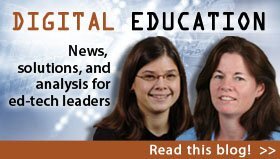Young people’s experiences in playing and socializing online are developing their technical skills and media literacy in ways that rival the educational role of formal schooling, according to a recently released ethnographic .
The three-year study of the ways youth use new forms of media, called the Digital Youth Project, is part of a barrage of research projects on youth and digital media being funded under a $50 million initiative by the John D. and Catherine T. MacArthur Foundation.
With a three-year, $3.3 million grant from the Chicago-based foundation, field researchers from the University of California, Berkeley, spent extensive time observing, interviewing, and participating with young people in informal educational environments in which they were interacting with digital media.
That allowed researchers at Berkeley, the University of Southern California, in Los Angeles, and the University of California, Irvine, to look beneath “the social behavior you’re seeing online—kids hanging out with their friends,” said Mizuko “Mimi” Ito, one of the lead researchers on the project.

“What is different is that so much of what kids are learning about how to use media, manipulating information, and finding things online are taking place in an informal social context, rather than things they are learning in school,” she said.
Ms. Ito, a cultural anthropologist at USC’s Institute for Multimedia Studies, said the findings released on Nov. 20 show that “literacy around these new kinds of new media is being developed in informal, out-of-school spaces,” out of the view of educators, who have not embraced the digital media, such as online games and communities.
‘Generational Gap’
“I think it has been challenging for teachers and educational institutions in the formal school space to incorporate all of these [communities],” Ms. Ito said. “Part of what we’re seeing is a generational gap” between parents and teachers, on one hand, who tend to perceive the online spaces as threatening, and young people, on the other, who view them as full of positive potential.
The researchers found that young people commonly use online networks to pursue two different types of activity—one that is friendship-driven and one that is interest-driven.
Digital media allows youth to be “in constant contact with their friends via texting, instant messaging, mobile phones, and Internet connections,” the report says.
“This continuous presence requires ongoing maintenance and negotiation, through private communications like instant messaging or mobile phones, as well as in public ways through social-network sites such as MySpace and Facebook,” the report adds.
69��ý’ online friends are usually those they have already, in their offline lives, researchers said.
A smaller number of young people, the report says, go into the online world to explore interests, such as hobbies, “and find information that goes beyond what they have access to at school or in their local community.”
In interest-driven networks, “young people have the ability to engage in a peer group that’s passionate about a particular area of interest and be able to participate in that interest in a self-directed way, and get around the gatekeepers to knowledge,” such as schools, Ms. Ito said.
Educators and parents understandably are wary of students being exposed to danger online, but “we feel like some of the fear and panic around predators and ‘stranger danger’—those kinds of things have been overblown,” Ms. Ito said.
“There are some very real areas that adults should be engaged in and educators should be engaged in,” she added. “What are appropriate ways to share information online? What are the ethical ways to use information? Those are issues that really require engagement for adults—parents and teachers.”
Educational Implications
Ms. Ito recommended that schools rethink policies not to allow students to use school computers and Internet connections to gain access to various digital media, including social-networking sites, during after-school programs.
Ms. Ito said the study, which includes findings beyond those that are summarized in the paper released this week, will be a resource for the other research projects in the MacArthur Foundation’s initiative on digital media and youth.
She said her ongoing research would explore the educational implications of the current study.
Among the questions researchers will explore is the potential for making greater use of the learning opportunities available through online resources and networks, as well as whether young people’s participation in this networked world suggests new ways of thinking about the role of education.
Other questions include whether education should be recast as a process of guiding youth to participation in public life, rather than the narrower goal of preparing them for jobs and careers, and whether “engaged and diverse publics that are broader than what we traditionally think of as educational and civic institutions” can be enlisted in the educational process.




